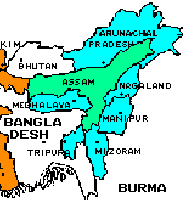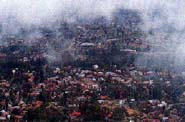Commentary / Ashok Mitra
The seven about-to-vanish sisters of the North East
 Elections, some sort of, have taken place in Jammu and Kashmir.
Few even amongst the devoutly patriotic minded will have the taste
or inclination to offer an affirmative response to the query whether
these elections have been either 'free' or 'fair'. Nothing is
fair in love and war. And if Kashmir was the passion for Jawaharlal
Nehru half-a-century ago, it now connotes war to considerable groups
of countrymen. And a war has its own codes.
Elections, some sort of, have taken place in Jammu and Kashmir.
Few even amongst the devoutly patriotic minded will have the taste
or inclination to offer an affirmative response to the query whether
these elections have been either 'free' or 'fair'. Nothing is
fair in love and war. And if Kashmir was the passion for Jawaharlal
Nehru half-a-century ago, it now connotes war to considerable groups
of countrymen. And a war has its own codes.
But then, Kashmir at least possess a certain charisma. It has
made the agenda of the Untied Nations, on and off, during these
five decades. In contrast, the Seven Sisters in the North-East
-- Arunachal Pradesh, Assam, Manipur, Meghalaya, Mizoram, Nagaland,
Tripura -- do not make even domestic headlines. The rest of the
country have only absentminded curiosity for the Seven Sisters;
perhaps not even that.
Discontented subalterns
 The compliments are duly returned; overwhelming sections in the
North-East do not feel to be any part of this nation. At most,
they will concede as being sullen, reluctant, discontented subalterns
of the hegemony functioning in the Indo-Gangetic valley. The discontent
inside is no longer in an inchoate state. Determined young men
and women are on the rampage; they have been more or less on the
rampage for several decades now. There has been little variation
in the storyline during these decades. If insurgency abates a
bit in Nagaland, it rears its grisly head in Meghalaya. Or in
Manipur. Or in Tripura. Or in Mizoram.
The compliments are duly returned; overwhelming sections in the
North-East do not feel to be any part of this nation. At most,
they will concede as being sullen, reluctant, discontented subalterns
of the hegemony functioning in the Indo-Gangetic valley. The discontent
inside is no longer in an inchoate state. Determined young men
and women are on the rampage; they have been more or less on the
rampage for several decades now. There has been little variation
in the storyline during these decades. If insurgency abates a
bit in Nagaland, it rears its grisly head in Meghalaya. Or in
Manipur. Or in Tripura. Or in Mizoram.
The largest of the Seven Sisters, Assam, has, for all practical
purposes, been a no man's land for the past few years. Guwahati,
despite being the state's headquarters, is itself hazy territory:
army, police and paramilitary personnel on the one hand, and the
ULFA cadets on the other have seemingly reached an informal understanding
with one another: they alternate in taking charge of life and
living in and around Guwahati and Dispur; the elite and the middle
classes huddle together in apprehension and bemusement, waiting
for the killings next time.
Out of sight is out of mind. The North-East is away from the nation's
mainstream of consciousness. Since, along with the basic infrastructures,
the infrastructure of tourism too has shrunk in the region, even
curiosity-seekers have not been coming; foreigners in any case
are discouraged from hovering in the neighbourhood. A kind of
vague awareness did seep into the corridors of power in New Delhi
by the sixties that this sensitive border region needed to be given
some special attention.
The operational approach has, however, been consistently paternalistic.
A North-East Council, in which all the Seven Sisters are represented,
has met in perfunctory sessions every now and then; under the
council's direction, well-meaning essays have been written on
the strategy or strategies for transforming the economic conditions
and, at the same time, protecting the ethnic and cultural personal
of the people inhabiting the region. the essays have remained just
that.
The basic problem has been the failure to identify the factors
which have alienated the citizenry here from the citizenry in the
other parts of the country. At one end, any discussion on the
issues of ethnicity or language has been purposely discouraged,
but targeting for comprehensive economic development has not made
the agenda either.
To pick just one example: If only the waters
of the world's most magnificent rivers were harnessed properly,
the plains in the North-East would have been awash with irrigation
and capable of raising five to six crops annually instead of the
measly monoculture which is its current fate. The production of
power too would have soared.
 You, however, need great minds to chart and execute a great vision.
A certain petty-mindedness, instead, clouded the picture. Mobilising
the immense creative potential latent in the Brahmaputra would
conceivably entail inter-country negotiations, involving Bangladesh
and who knows, perhaps Nepal and China as well. The mandarins
in New Delhi have been undeviating in their resolve: The economic
development of the North-East could wait, Brahmaputra is our property,
no intruders are to be allowed any meddling under any pretext.
You, however, need great minds to chart and execute a great vision.
A certain petty-mindedness, instead, clouded the picture. Mobilising
the immense creative potential latent in the Brahmaputra would
conceivably entail inter-country negotiations, involving Bangladesh
and who knows, perhaps Nepal and China as well. The mandarins
in New Delhi have been undeviating in their resolve: The economic
development of the North-East could wait, Brahmaputra is our property,
no intruders are to be allowed any meddling under any pretext.
|





 Elections, some sort of, have taken place in Jammu and Kashmir.
Few even amongst the devoutly patriotic minded will have the taste
or inclination to offer an affirmative response to the query whether
these elections have been either 'free' or 'fair'. Nothing is
fair in love and war. And if Kashmir was the passion for Jawaharlal
Nehru half-a-century ago, it now connotes war to considerable groups
of countrymen. And a war has its own codes.
Elections, some sort of, have taken place in Jammu and Kashmir.
Few even amongst the devoutly patriotic minded will have the taste
or inclination to offer an affirmative response to the query whether
these elections have been either 'free' or 'fair'. Nothing is
fair in love and war. And if Kashmir was the passion for Jawaharlal
Nehru half-a-century ago, it now connotes war to considerable groups
of countrymen. And a war has its own codes.
 The compliments are duly returned; overwhelming sections in the
North-East do not feel to be any part of this nation. At most,
they will concede as being sullen, reluctant, discontented subalterns
of the hegemony functioning in the Indo-Gangetic valley. The discontent
inside is no longer in an inchoate state. Determined young men
and women are on the rampage; they have been more or less on the
rampage for several decades now. There has been little variation
in the storyline during these decades. If insurgency abates a
bit in Nagaland, it rears its grisly head in Meghalaya. Or in
Manipur. Or in Tripura. Or in Mizoram.
The compliments are duly returned; overwhelming sections in the
North-East do not feel to be any part of this nation. At most,
they will concede as being sullen, reluctant, discontented subalterns
of the hegemony functioning in the Indo-Gangetic valley. The discontent
inside is no longer in an inchoate state. Determined young men
and women are on the rampage; they have been more or less on the
rampage for several decades now. There has been little variation
in the storyline during these decades. If insurgency abates a
bit in Nagaland, it rears its grisly head in Meghalaya. Or in
Manipur. Or in Tripura. Or in Mizoram.
 You, however, need great minds to chart and execute a great vision.
A certain petty-mindedness, instead, clouded the picture. Mobilising
the immense creative potential latent in the Brahmaputra would
conceivably entail inter-country negotiations, involving Bangladesh
and who knows, perhaps Nepal and China as well. The mandarins
in New Delhi have been undeviating in their resolve: The economic
development of the North-East could wait, Brahmaputra is our property,
no intruders are to be allowed any meddling under any pretext.
You, however, need great minds to chart and execute a great vision.
A certain petty-mindedness, instead, clouded the picture. Mobilising
the immense creative potential latent in the Brahmaputra would
conceivably entail inter-country negotiations, involving Bangladesh
and who knows, perhaps Nepal and China as well. The mandarins
in New Delhi have been undeviating in their resolve: The economic
development of the North-East could wait, Brahmaputra is our property,
no intruders are to be allowed any meddling under any pretext.